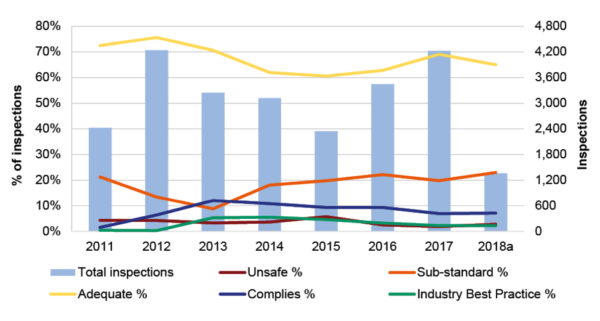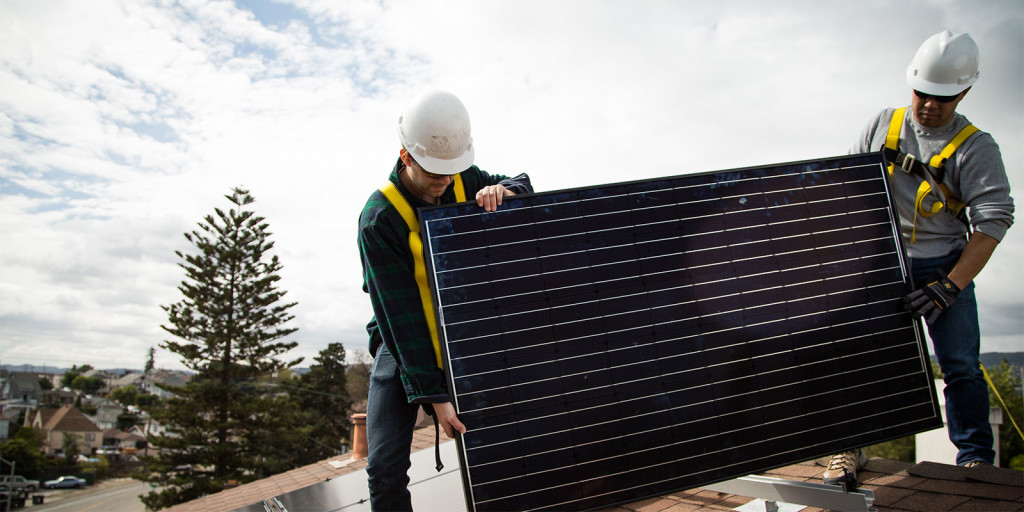Federal Energy Minister Angus Taylor followed up yesterday’s acrimonious Council of Australian Governments (COAG) Energy Council meeting with a dire warning for state governments about the safety of rooftop solar systems.
His assertion that people’s lives may be at risk is based on interpretation of the national audit of the Renewable Energy Target released by the Australian National Audit Office on December 17, and was headlined by The Australian newspaper this morning as “Warning of deaths over solar panel installation”.
The audit itself reported that, from the time it began its annual inspections of “small generation units” (for rooftop solar, that means not more than 100 kW capacity) in 2011, until mid-August 2018 it had undertaken 24,371 inspections. Noting that compliance standards had become more stringent over time, it said, “Between 21.7 and 25.7 per cent of inspected installations were rated as ‘unsafe’ or ‘sub–standard’ each year.”
Those deemed “unsafe” in 2018 made up 2.7%.
Taylor said to The Australian and similarly on radio programs around the country today, “I’ve written to every state and territory minister highlighting the severity of the issue … we want to make sure safety comes first … This is a rapidly growing industry and we can’t risk people’s lives.”
The same day, Australia's Clean Energy Council (CEC) issued a statement in response, saying that the solar industry is one of the most heavily regulated areas of electrical safety in the country. “Obviously no industry is perfect,” said CEC chief executive, Kane Thornton, “but the percentage of unsafe systems has declined this decade from 4.2 per cent to 2.7 per cent. This is better than the electrical industry as a whole.”

Graphic: Clean Energy Regulator
The Clean Energy Council is responsible for installer accreditation, training and disciplinary action. Over the period of its jurisdiction it has liaised with the Clean Energy Regulator on regular findings of the National Audit as they relate to renewable energy installations, and implemented training programs and requirements of its accredited solar PV installers in line with those findings.
Says Thornton, “The audit report noted that a single element that is not completely up to scratch does not mean a system is unsafe. We will use the report — as we do with similar reports from the Clean Energy Regulator which are published every year — to further improve the standards and compliance across the industry.”
CEC Accreditation team has improved quality of outcomes in the solar industry this year. 173 installers have been suspended and 5 installers have been cancelled. #modules approved has been slashed https://t.co/XpC6ogY7DW pic.twitter.com/gyu0BMZRAZ
— Warwick Johnston (@SunWiz_) December 14, 2018
Popular content
Electrical bodies in each Australian state are responsible for electrical safety, and Thornton says, “The Clean Energy Council has lobbied for some time for a single national electricity body to ensure greater consistency of approach including improved resourcing and consistent inspection programs.”
This year, a survey of 1028 rooftop solar owners across Australia by the consumer advocacy group Choice revealed that, “Customer satisfaction levels are high across most brands of solar systems.” And “The vast majority of respondents rated the performance of their panels, inverter and batteries positively.”
This was despite some one-third of respondents having experienced a problem with their system, and a similar number of solar uses having experienced problems with their installer.
The Choice findings support the audit note, and the CEC’s assertion that, “Both the safety and quality of solar power installations continue to improve as a result of initiatives introduced by the industry, and the bar has already been set very high.” Its survey found: “Owners of systems installed after 2016 gave their installers a higher rating than owners of systems installed in 2013 or prior, indicating a lift in standards.”
The CEC advises prospective solar customers and those now increasing the capacity of their rooftop systems to choose from the Council’s Approved Solar Retailers — who have committed to excellence in customer service and a minimum five-year whole-of-system warranty — and to make sure that they use an installer accredited by the CEC.
Existing solar PV owners are advised to have their system serviced every two years by an accredited professional — to ensure they’re getting the best output and performance possible, and ensure ongoing safety of system components.
More than 2 million Australian homes have now installed rooftop solar PV systems, “and the majority of these systems are performing well and up to expectations,” said Thornton.
Natalie Filatoff
This content is protected by copyright and may not be reused. If you want to cooperate with us and would like to reuse some of our content, please contact: editors@pv-magazine.com.


A German report states 0.016% of 1.3 million PV systems (until 2013) triggered heat or fire damages.
A UK report states 0.0058% of 1 million PV systems (2010 to 2017) triggered heat or fire damages.
Probably the Germans are not less accurate or less reliable. The look at newer systems in UK may cause the lower probability of damages.
So the current standards may be quite good and sufficient.
And the solar industry / installers learn increasingly, how to enhance safety.
I guess the key lies in training and qualification of the involved people, like in every new technology.
So don’t let worry you.
Especially not from false prophets, like module level shut down, which probably may worsening the safety.
The highest risk for the reported problems are PV connectors (both reports).
Not because the connectors itself are not save, but a lot of failures can be made, especially using connectors from different manufacturers (which is not allowed, even if they are “compatible”.)
At least, doubling the connectors (by using add on module level power electronics) automatically doubles this risk.
Keep it simple and keep up to date, are probably some of the best recommendations.
The coal lobby and its tame politicians are getting desperate. Taylor will need an actual fire and TV footage of a sobbing mother and child with their burning solar-roofed house in the background to get any traction wit this scare story.
Because solar panels can not be switched off they are energised whenever the sun shines even when the system has been “shutdown”. Therefore all solar are potentially unsafe if not fitted with a solar module isolator switch such as micro inverter or Solar Safety ShutOFF switch. These are NOT DC ISOLATORS. DC isolators are not module isolation switches.
Module level power electronics (MLPE, micro inverter, DC-optimizers, ….) increase the risk of a fire and insofar the risk for a firefighter!
To equip each module with an isolator-switches or similar only theoretically may reduce the risk for a firefighter to get injured, but it will INCREASE the risk of fire, by adding additional components (at least additional DC connectors) that can fail!
So you increase your own risk to set your house on fire, for theoretically decreasing the risk for a firefighter.
By the way, avoiding the risk for a fire, undeniably preserves a firefighter to get injured.
That’s one of the results / conclusions of the mentioned reports.
Don’t get fooled by other statements.
Every firefighter knows (at least should know) how to deal with electric energy.
They have guidelines how to deal (extinguish a fire, ….) with electricity.
To reduce a risk of only 0,006%! (fire caused by PV) anybody has to be quite careful with any measure.
The opposite is much more likely! (especially with MLPE)